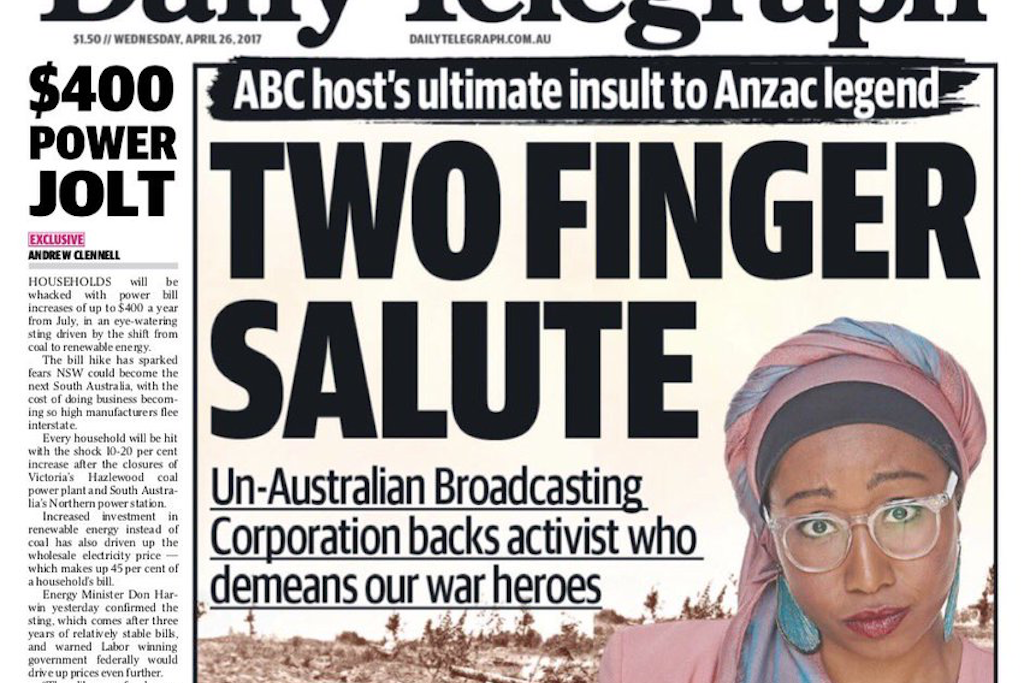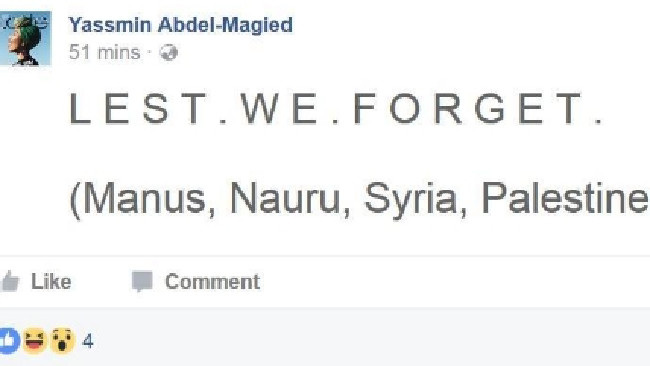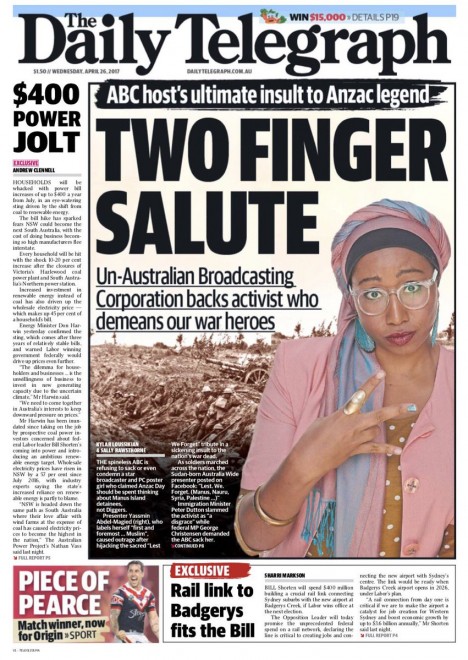These Anzac Day “Controversies” Reveal The Huge Hypocrisy Of Australian Conservatives
Turns out Pauline Hanson and George Christensen only support freedom of speech when they agree with what's being said.

Nothing sums up the confused incoherence of Australia’s conservative media figures and politicians better than their response to a seven-word Facebook post published on Anzac Day yesterday.
The post read: “Lest. We. Forget. (Manus, Nauru, Syria, Palestine)”. It was written by activist and author Yassmin Abdel-Magied and it turned some of the country’s staunchest defenders of free speech into a troupe they would normally deride as ‘hyper-triggered, PC-police’. They demanded Abdel-Magied’s resignation, and in one case even her deportation — simply because she wrote something they disagreed with.

What’s Everyone Angry About?
After being criticised on Facebook for the post Abdel-Magied deleted it, explaining “It was brought to my attention that my last post was disrespectful, and for that, I apologise unreservedly”. She posted a new message that just said “Lest we forget”.
But that didn’t stop the criticism, with commenters accusing her of “disloyalty” and “disrespecting Australian values”. Others said she was using a day of commemoration to pursue a political agenda and had “hijacked” the meaning of Anzac Day. The media soon picked up the story, culminating in this extraordinary Daily Telegraph front page:

PS. She’s holding up three fingers.
This morning Pauline Hanson posted a bizarre and terrifying video urging her followers to “never forget” Abdel-Magied’s comments, attacking the ABC for not sacking her (weirdly by citing the ABC’s decision to stand-down Natasha Exelby), and suggesting that migrants who don’t “respect” Anzac Day should leave the country.
Conservative commentators Andrew Bolt and Gerard Henderson have both questioned whether Abdel-Magied has the qualifications to hold her job at the ABC.
Acting PM Barnaby Joyce said the ABC should take “further action” against Abdel-Magied. The immigration minister, Peter Dutton, has labelled her a “disgrace”, Senator Eriz Abetz called her comments “reprehensible” while Liberal MP George Christensen called for her to be sacked, adding that “self-deportation should also be considered”.
Yasmin should no longer on the public broadcaster's tax-funded payroll. Self-deportation should also be considered. https://t.co/xqs7ILx2xC
— George Christensen (@GChristensenMP) April 25, 2017
There’s a lot to unpack here, including what exactly “self-deportation” means (it seems to be euphemism for “go back to where you came from”). But there are two distinct things that need to be addressed. The first is the nature of what Abdel-Magied posted and whether it really can be described as the “ultimate insult” to the Anzacs, and the second is whether this kind of intense and racially-coded backlash against an expression of speech can ever be justified.
‘Demeaning Our War Heroes’
Part of the problem with trying to understand why Abdel-Magied’s comments attracted such a swift backlash is the nature of Anzac Day itself. Despite government-funded initiatives to try and create one specific narrative around Anzac Day (with a particular focus on our British history), it means different things to different people.
For some, it’s purely about remembering the lives lost in Gallipoli and World War I. For Turkish-Australians, it can be about celebrating Mustafa Kemal Ataturk, who fought against the Anzacs and went on to found the modern Turkish state. For others, it’s about supporting our veterans. And for plenty more it’s about getting trolleyed at the pub and playing two-up.
But surely within this range of activities there’s space for some reflection on the consequences of war, both historically and in the modern day. This is what Abdel-Magied’s post was aiming to do.
There are refugees our government has locked up on Manus Island and Nauru who have fled war; in some cases they have fled wars that we are responsible for. Syrians and Palestinians are experiencing long-running conflicts that we have chosen to engage in, either militarily in the case of Syria or diplomatically in the case of Palestine. The idea that we can somehow excise discussion around these wars, and the refugees they produce, on a day that is supposed to be about reflecting on war and its consequences doesn’t make much sense.
But even if you think Abdel-Magied didn’t express her views respectfully enough it seems like a very long bow to position them as the “ultimate insult”. Compare the response to Abdel-Magied’s Facebook post to this one by a Darwin bar, promoting an Anzac Day wet t-shirt competition:

The event was criticised on Facebook for being “disrespectful” and “sexualising women on something respectful as Anzac Day”. The president of Darwin’s RSL wasn’t happy but he gave very measured advice and steered away from condemnation: “Just remember the fallen, a lot of people gave their lives. We’ve lost a lot of men and we’re still losing them in conflicts overseas, but the good thing is we’ve had no more attacks on our land and that’s an important thing to remember.”
But that was it. No heavy-handed political denunciations. Compare the muted response to an Anzac Day wet t-shirt contest with the ferocious backlash Abdel-Magied received for daring to bring up our treatment of refugees. The attacks from Hanson and Coalition MPs don’t seem to be entirely about the ‘sanctity’ of Anzac Day, but the fact that they really can’t handle having their own comfortable narratives challenged — especially by a migrant Muslim woman.
So Much For Free Speech
The clearest takeaway from this whole saga is how hypocritical conservative politicians can be on the question of freedom of speech. The same people who are now demanding Abdel-Maiged be fired and booted from the country for expressing her freedom of speech were just a few weeks ago positioning themselves as free speech purists in their defence of Bill Leak.
RIP Bill Leak. You will be remembered as a champion free speech. One of the few brave enough to point out when the emperor had no clothes.
— Pauline Hanson (@PaulineHansonOz) March 10, 2017
George Christensen, who was the most vociferous in his attacks on Abdel-Magied, spent his dying days as parliamentary whip championing a full repeal of Section 18C on the grounds of free speech. It’s absurdly inconsistent to defend a cartoonist’s right to publish work that regularly offends minorities while calling for someone else to be sacked because what they’ve said offends you.
The real test for freedom of speech supporters isn’t whether you’ll stand up and defend someone for saying something you agree with. It’s whether you’ll defend the right of someone to say something even if you fundamentally disagree with it. On that measure, Christensen, Hanson and co. have been found desperately wanting.
free speech except about anzac day, hey? some wild and feral #auspol hypocrisy on show today…
— Scott Ludlam (@SenatorLudlam) April 26, 2017
There were a couple of other incidents on Anzac Day that exposed a similar level of hypocrisy. Yesterday 32-year old Joe Mekhael was arrested after shouting anti-war slogans during a dawn service in Sydney. Mekhael was charged with behaving in an offensive manner in a public place and resisting an officer in the execution of duty.
Whether you think Mekhael’s protest was untimely or offensive is besides the point. If you’re a freedom of speech purist (as those who want Section 18C repealed claim to be) arresting someone for holding a peaceful protest on the basis that it was “offensive” is a clear abridgement of that freedom. It’s a far greater abridgement than anything in Section 18C, which doesn’t carry any criminal penalties.
So you might expect the usual suspects to get worked up by it? After all, this is someone being arrested and charged because they expressed a political view. Maybe George Christensen would now devote his parliamentary career to reforming the law and protecting this kind of freedom of speech? Nope. Not a peep. Instead, Christensen and the rest piled on Abdel-Magied.
Meanwhile in South Australia, Kaurna elder Katrina Ngaitlyala Power was attacked by the state veteran’s affair minister for focussing on “political issues” after she gave a Welcome to Country referencing the “stolen land” of her ancestors. The federal education minister, Senator Simon Birmingham, also criticised Power, saying that Anzac Day was “not a chance to prosecute other agendas”.
What Does All Of This Actually Mean?
All of these Anzac Day “controversies” highlight how insecure our conservative politicians and media commentators are when it comes to discussing what the day represents. They’re happy to politicise it to create narratives that suit them, but if you step outside that frame by bringing up refugees or the history of Indigenous persecution you become a target.
And if you’re a migrant woman of colour who also happens to be a Muslim and has demonstrated integration into Australia by every possible measure, and therefore represent everything these guys are petrified of, your right to freedom of speech evaporates. You don’t just become a target for criticism, you become the focal point for a sustained campaign designed to destroy your livelihood.
But despite these increasingly ferocious, deranged attacks the real losers out of this situation are Hanson, Christensen and their ilk. They’ve been exposed as desperate hypocrites, willing to throw apparently fundamental principles out of the window in an over-egged pursuit on the basis of a seven-word Facebook post.
–
Osman Faruqi is Junkee’s News and Politics Editor. You can follow him on Twitter at @oz_f.